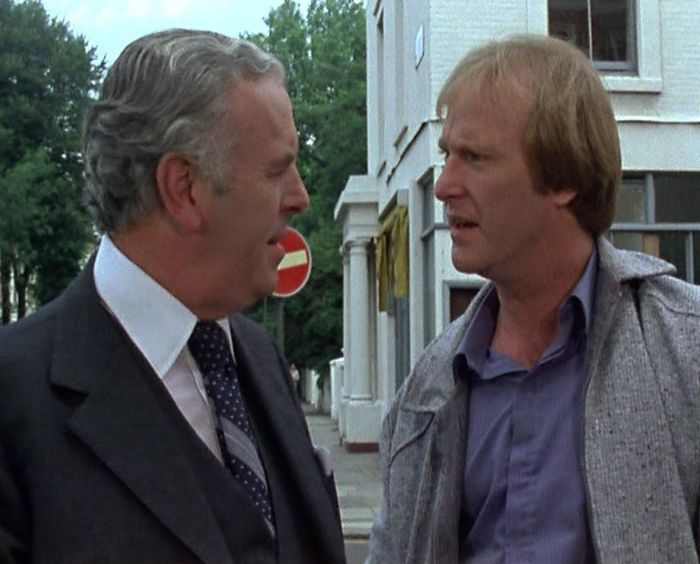The People had stories, but no history; everything that had happened was still happening.
—Ka, by John Crowley
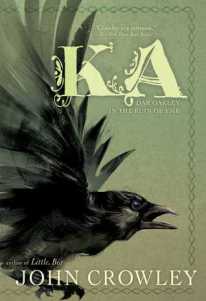 The hero of John Crowley’s brilliant new novel, Ka, is a crow, Dar Oakley, who traverses both the realms of crows and human beings. Dar Oakley is an inquisitive crow, flying farther than most birds, and returning with arcane information about geography and anthropology. His stories seem fantastic to the other crows, who laugh at him until they finally follow him on a journey. Dar Oakley is the first crow to give himself a name, and starts the trend of individual naming.
The hero of John Crowley’s brilliant new novel, Ka, is a crow, Dar Oakley, who traverses both the realms of crows and human beings. Dar Oakley is an inquisitive crow, flying farther than most birds, and returning with arcane information about geography and anthropology. His stories seem fantastic to the other crows, who laugh at him until they finally follow him on a journey. Dar Oakley is the first crow to give himself a name, and starts the trend of individual naming.
John Crowley is a versatile writer who has won the World Fantasy Award and the American Academy of Arts and Letters Award in English. I am a great fan of his Aegypt, a quartet of novels about philosophy, science, magic, and love. (For more information, follow this link to Goodreads.) I also enjoyed his historical novel, Lord Byron’s Novel, in which Bryon’s daughter Ada discovers an unpublished manuscript of a novel by Byron. But Ka is very different, a kind of prose epic.
On one level, Ka is an unputdownable story of a talking crow. I love the bird’s-eye view of history, and the mythic journeys of Dar Oakley. On another level, it explores the meaning, or lack thereof, of life and death. And the crow’s autobiography is occasionally interrupted by a dying human narrator, who is reconstructing the story from his own conversations with Dar Oakley. This man, who lives in a dystopian near-future, is dying of a new disease. He has already lost his wife, and has little to live for. One day he rescued Dar Oakley from the back yard where he found him ill, near death, he thought.
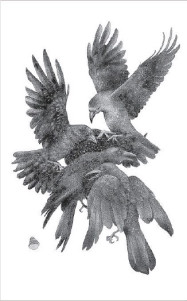
illustration by Melody Newcomb
Crows have a close relationship with humans, in that they follow them to find food, the remains of animals they have hunted, their crops, or even human corpses. But Dar Oakley is not just a scavenger. He learns human language. And he accompanies his human friends to the Underworld, or realm of death, where he steals immortality (which is a burden to him).
Because of the gift/curse of immortality, he lives for 2,000 years. His companions include a shaman named Fox Cap; a monk; and a Native American storyteller. Dar Oakley outlives them all; he also outlives his mates and his children. And, in a brilliant reimagining of the Orpheus and Eurydice myth, Dar Oakley travels to the Underworld to attempt to rescue his beloved mate, Kits. Like Orpheus, he fails.
Crowley’s language is beautiful; there are allusions to Dante, Virgil, and doubtless many other books I do not know. I found this an enthralling read, really hypnotic. This is one of my favorite books of the year (and why didn’t it make any award shortlists?). It reminds me slightly of Kazuo Ishiguro’s literary fantasy, The Buried Giant.
There are also lovely illustrations by Melody Newcomb.
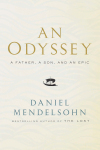 NOT FINDING WHAT YOU WANT ON BLACK FRIDAY. It was a lovely day yesterday so I bicycled to Barnes and Noble.
NOT FINDING WHAT YOU WANT ON BLACK FRIDAY. It was a lovely day yesterday so I bicycled to Barnes and Noble.
What was on my list? Emily Wilson’s new translation of the Odyssey. In a way it’s a blessing they didn’t have it, because I have three other translations, and anyway I’m an Iliad person. But I did find another book I wanted, Daniel Mendelsohn’s An Odyssey: A Father, A Son, and an Epic. When his 81-year-old father signs up for Mendelsohn’s class in the Odyssey at Bard College, their relationship undergoes some changes.
LITERARY LINKS.
1. I very much enjoyed the Books of the Year list at the Spectator. There are many lists, but this is the only list from which I copied several titles. I also listened to a podcast called Can Anna Karenina Save Your Life?, in which Sam Leith interviews Viv Groskop about her new book, The Anna Karenina Fix: Lessons from Russian Literature.
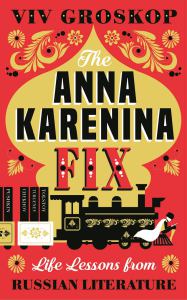 2 I am a great fan of Mary Wesley, and was very excited to read a review in the TLS of Darling Pol: The letters of Mary Wesley and Eric Siepmann, 1944–1967. The reviewer very much enjoyed it–and what a relief that was, since I had just been traumatized by a snotty review of one of my favorite books of the year, Yopie Prins’s Ladies’ Greek!
2 I am a great fan of Mary Wesley, and was very excited to read a review in the TLS of Darling Pol: The letters of Mary Wesley and Eric Siepmann, 1944–1967. The reviewer very much enjoyed it–and what a relief that was, since I had just been traumatized by a snotty review of one of my favorite books of the year, Yopie Prins’s Ladies’ Greek!
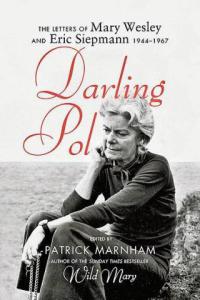 The reviewer LINDSAY DUGUID writes,
The reviewer LINDSAY DUGUID writes,
Examining the lives of novelists, especially female novelists, has become an accepted way of approaching their work. The facts unfolded in biographies and the feelings expressed in letters can also be found in their fiction, where they appear again and again in different guises. The long and interesting life of Mary Wesley (1912–2002) can be seen as a rich source for the series of novels she wrote in old age, in which familiar themes recur.
I do hope this is published in the U.S. eventually.
Share this: